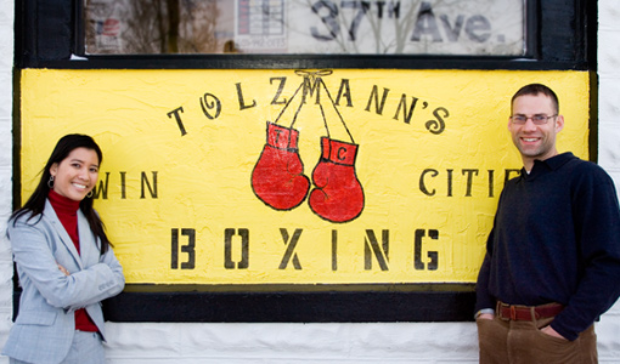Over the past few years, I have been on a scholarly detour from my primary areas of banking and commercial law into the area of feminist legal theory. This detour was motivated by a desire to explore an aspect of my faith tradition for personal reasons. It has led me into a more public engagement with the predominantly secular intellectual milieu of feminist legal theory. Along this journey from private concern to public engagement, I have had to grapple with the challenge at the heart of the mission of the University of St. Thomas School of Law: our dedication to “integrating faith and reason in the search for truth.”
A provocative articulation of that challenge was issued by the philosopher Eva Feder Kittay last March at the UST Law Journal symposium on “Restructuring the Workplace to Accommodate Family Life.” In a panel exploring the possibility of dialogue across philosophical and faith traditions in feminist legal theory, Kittay responded to the faith-based legal feminist theories outlined by professors Susan Stabile from the University of St. Thomas School of Law and Marie Failinger from Hamline Law School, with the following caution:
If we can agree that we hold to shared beliefs even if we are motivated by different comprehensive doctrines, that we can justify these beliefs in terms that others of us can accept, then we can find (or forge) an overlapping consensus. In our case, we are not looking for an overlapping consensus to support political liberalism as much as we seek an overlapping consensus upon which to work together as feminists for political and social reform. To allow this to happen, secular feminists need to curb their suspicion of the faith-based motivations of religious feminists and religious feminists need to check their insistence on having hold of the deeper truths.
Our mission’s charge to integrate our faith and our reason in the search for truth applies equally to each of us as we pursue our scholarly agendas, our crusades for social justice, our paths to responsible engagement as citizens, or even the appropriate balance between our public and our private lives. Those of us attempting to assert a faith-based perspective in these arenas are all too conscious of the need for our debate partners to “curb their suspicion” of our faith-based motivations.
But what are we to make of Kittay’s challenge that we need to “check our insistence on having hold of the deeper truths”? How is that consonant with the call to integrate our faith and our reason? In my scholarly journey over the past few years, I have found myself dealing with my own conviction that my faith was providing me access to “a deeper truth” in various ways – all of which are, perhaps, legitimate strategies for different debates or stages of life.
My inquiry into feminist legal theory began a few years ago, with an invitation from another Catholic law school to speak at a conference on the identity and mission of Catholic law schools. Because it was fairly clear that I had been asked to participate, in part, because of concerns about the under representation of women at the conference, I decided to provide an unabashedly female perspective. In preparing this talk, I read, for the first time, the writings of Pope John Paul II on women, such as his 1988 Apostolic Letter, “On the Dignity and Vocation of Women” and his 1995 “Letter to Women.” Part of my motivation for this research was personal; it was my nagging desire to assess honestly whether my own career path – involving decades of juggling a career and raising my four children – was consonant with the Catholic Church’s notion of the vocation of motherhood.
I wanted to figure out how my faith should inform my reason in my search for the truth about a particular social issue – the role of the working mother. What I discovered was an urgent call by the Church for the voice of what John Paul II referred to in his “Letter to Women” as the “feminine genius” of women who work – the particular insights of women in “fostering the growth of a culture that unites reason and feeling,” in “presenting a model of life that remains open to the sense of ‘mystery,’” and in “establishing economic and political structures ever more worthy of humanity.”
At the same time, the Church insists that the role of the mother in preserving the family is crucial to the flourishing of a healthy society. Recognizing the tension between these two equally important values, the Church has, over the past decades, become increasingly emphatic in its calls for reforms to the workplace to enable women to be active in the public sphere without sacrificing their family lives.
In my personal exploration of my faith’s teachings, there was obviously no need for me to be shy about the fact that I considered the faith tenets upon which I was relying to be “deepest truths.” In the course of that inquiry, though, I also reached some conclusions about more general questions of social policy – namely the need to restructure the workplace to accommodate family life. This conclusion inspired me to begin some public conversations on this topic: first, at the Catholic law school which had invited me to speak; second, in a talk at a conference of the Terrence J. Murphy Institute for Catholic Thought, Law and Public Policy (eventually published as “Should Bearing the Child Mean Bearing All the Cost? A Catholic Perspective on the Sacrifice of Motherhood and the Common Good”); and finally, in an article published in the Catholic University Law Review, “Motherhood and the Mission: What Catholic Law Schools Could Learn from Harvard about Women.”
Because I engaged in public debate on these topics, I had to be more rigorous in my application of reason to the faith convictions I was integrating in my arguments. Still, since my audiences were largely Catholic, Kittay’s admonition to “check my insistence on having a hold on the deeper truths” was not particularly appropriate. Indeed, for these audiences, I considered my primary task to demonstrate that my reasoning was, in fact, anchored in tenets of faith – that my ultimate conclusions were based on Church teachings, which was what gave them much authority with the members of my own Church whom I was attempting to persuade.
To effect widespread social change, though, the conversation has to be extended beyond one’s own faith community. Ultimately, to engage the wider community – either the wider community of feminist legal theorists or the wider community of the public square that must be persuaded to adopt widespread social or legal reforms – we must resort to arguments that do not expressly rely on a common religious belief. In this larger conversation, Kittay’s advice strikes true in one respect. Our arguments cannot be articulated in terms of the “deeper truth” of faith underlying our arguments.
However, I do not believe that means that we must, in Kittay’s words, “check our insistence on having hold of the deeper truths.” That conviction is what leads us to the position we are asserting; however, that conviction should also give us confidence that our religious beliefs are not discordant with reason. We can search for other sources of similar arguments that are not based on our particular faith convictions, and we can assert arguments for the particular policy prescriptions we advocate in secular language.
In the context of workplace restructuring, for example, I have found a striking convergence between the arguments of Catholic teachings and the arguments of a school of secular feminists known as relational, care or dependency feminists. I have explored these convergences in my first two articles and in “West, MacIntyre and Wojty?a: Pope John Paul II’s Contribution to the Development of a Dependency-Based Theory of Justice.”
My search for an authentically Catholic feminist legal theory also has led me to philosophical theories of gender identity, particularly the theory of complementarity, which posits that men and women are fundamentally different, yet fundamentally equal. This theory has its roots in a Thomistic affirmation of the unity of body and soul; it was developed by a group of predominantly Catholic philosophers who rejected the Cartesian dualism underlying most post-Enlightenment philosophy – phenomenologists such as Dietrich and Alice von Hildebrand and St. Edith Stein, and personalists such as Jacques and Raissa Maritain, Emmanuel Mounier and Gabriel Marcel. These schools of thought can provide vocabulary, arguments and frameworks for a feminist legal theory that are consonant with my faith beliefs, but do not depend on tenets of faith for their logical integrity.
The more I study, the more I discover traces of agreement with some of the basic ideas underlying complementarity in the writings of philosophers who do not share my faith traditions, such as the Jewish philosopher Leon Kass and the socialist feminist Alison Jaggar. These traces of agreement are the subject of my current scholarly attention, as I seek to continue the dialogue with secular feminist legal theorists that was so fruitfully modeled during UST Law Journal’s March symposium. In this type of dialogue, my confidence that the truth requires an integration of my faith and my reason continues to be a prime motivation for me. However, in this context, I believe Kittay’s caution is entirely appropriate – insisting on conducting the dialogue on the basis of whose ultimate truths are more “deeply held” would be unproductive.
I am not certain that I will ever be able to persuade a substantial number of corporations, voters or feminist legal theorists of the merits of my arguments for either concrete policy prescriptions, such as workplace restructuring, or the notion of gender theory of complementarity. But I do believe hat the mission of UST Law calls me to take my faith convictions seriously when deciding where to focus my energy as a scholar and activist. Nor will I ever – despite my efforts to engage in the dialogue using secular, rational, philosophical arguments – attempt to hide that my motivations are fundamentally faith-based. Because, ultimately, I believe that one of the most difficult, and most important things that some of us are called to do in furtherance of the mission of UST Law is to have the courage to insist on keeping a place for our deepest convictions of faith – which we hold as the deepest truths – in public debate.
For Schiltz’ publications referenced in this article, visit https://papers.ssrn.com.
Author: Associate Professor Elizabeth Schiltz was one of the founding faculty members of the University of St. Thomas School of Law. Before joining St. Thomas, she taught at the University of Notre Dame School of Law. She teaches Contracts, Sales, Credit and Payment Devices, and Banking Law. Her research interests include banking regulation and feminist legal theory.
Read more from St. Thomas Lawyer.





